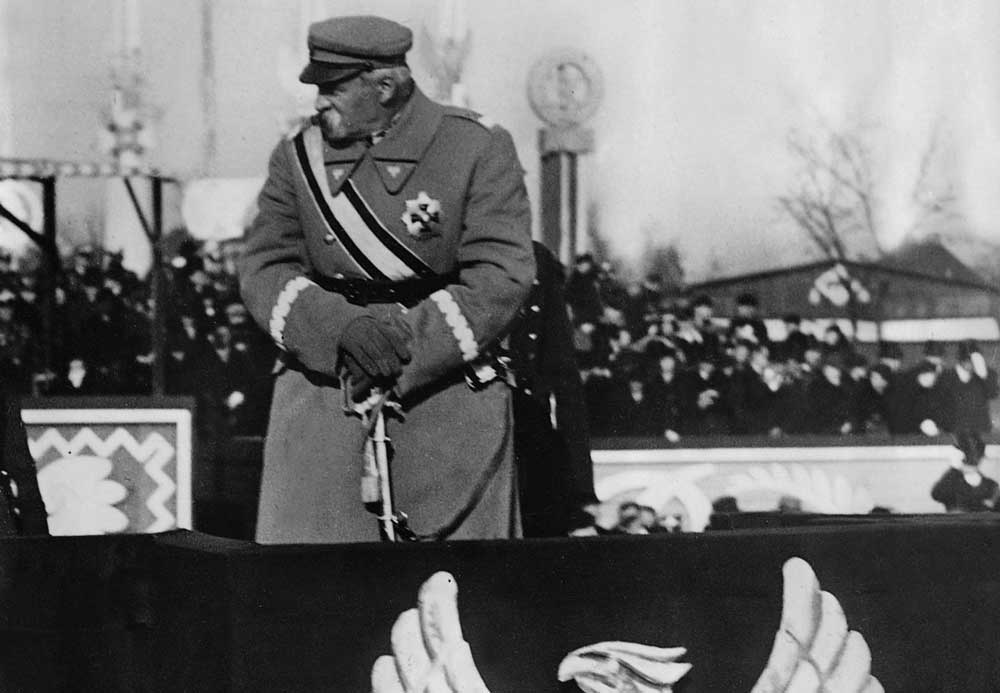Polished Off
Polished Off:- Reminiscing about his childhood decades later, Józef Pilsudski recalled that ‘sometime between the ages of seven and nine … I decided that if I lived past the age of fifteen … I would become an I will lead the rebellion and drive out the Muscovites’. Most young men act out of their youthful longing for heroism, but not Pilsudski.
Thank you for reading this post, don't forget to subscribe!Few historical figures are as undeservedly forgotten in the English-speaking world as Pilsudski, who revived Poland on the map of Europe after 123 years of tripartite partition. The biography of Joshua D. Zimmerman has been long awaited. Balanced, carefully researched, and extremely well written, it offers a captivating portrait of the man who straddled modern Poland, warts and all. Among those warts, the biggest is his dramatic coup d’état in 1926 and the subsequent authoritarian rule that lasted until his death in 1935.
His subsequent authoritarian turn is somewhat strange given the democratic ideology he espoused for several decades, as well as his actions as the founder of the Second Polish Republic, but the sheer force of his personality and the upheavals of his life. Not entirely surprising given the tumultuous years. over which he ruled. Pilsudski was born in 1867 to a landowning family in the small village of Zulov, not far from today’s Vilnius, which was then a part of the Russian Empire. More important to the Poles, it was part of one of the three divisions. At the end of the 18th century, Russia, Austria and Prussia partitioned the Polish-Lithuanian Commonwealth among themselves, which completely wiped Poland off the map of Europe.
Raised on romantic tales of brave Polish patriots fighting to restore their lost homeland, Pilsudski became a proud patriot from a young age. In his youth, he also became a staunch socialist, along with his older brother Bronisław. After being caught in the same plot in which Lenin’s older brother, Aleksandr, was executed, the Pilsudski brothers were arrested and sent to a long exile in Siberia.
And so Pilsudski spent his youth in the depths of Siberia, where the only break from the loneliness and monotony of the frozen landscape could be found in books and the acquaintance of other exiled socialists. Upon his return from exile at the age of 25, his convictions only hardened and he became the leader of the secret and illegal Polish socialist movement in the Russian Empire.
Not only the social revolution but also his agitation for an independent Poland brought him fame. He avoided arrest for years before being caught in 1900 with his party’s clandestine printing press. However, his occupation was short-lived. He managed to escape by feigning insanity and settled in Kraków in the Austrian division.
From there, he gradually became disillusioned with the course of Polish socialism, increasingly believing that only a proper army could free Poland from its partitioned state. He began to read obsessively about military affairs, studying in detail recent and historical wars that affected those around him. With no military experience and no state named Poland on the map, Pilsudski set about creating a Polish army.
Polished off Origin
It began as a riflemen’s association in an Austrian division, then developed into a militia and eventually an actual army. On the eve of World War I, Pilsudski accurately predicted how the war between the Great Powers would play out. Germany would defeat Russia militarily and then succumb to the physical might of the Allies. He initially fought with the Central Powers but, after acting much more independently, was arrested again, this time by the Germans.
In late 1918, two German officers visited Pilsudski and told him that he was free. The war was coming to an end and Polish independence was becoming a reality. Pilsudski was given dictatorial powers and used them to establish a parliamentary democracy. At the same time, Poland’s borders were unprotected from all sides. It went to war with the Soviet Union, with Piłsudski’s defense of Warsaw dubbed the ‘Miracle on the Vistula’, to secure its eastern frontier.
State building was not an easy task. Poland was a bitterly divided country. Pilsudski’s ideology was federalist and multinational, his lifelong desire being the revival of the Polish–Lithuanian Commonwealth in which Jews, Poles, Lithuanians, Ukrainians and others could all enjoy equal rights and representation in a grand federal state. His political rivals envisioned a narrow ethnically Polish and Catholic Poland instead and never forgave Piłsudski for his philosophies.
History of polish royalty
Five days after taking office, Poland’s first elected president (supported by Pilsudski) was assassinated by a right-wing painter. The nationalist press celebrated the event, while Pilsudski’s faith in parliamentary democracy was shaken and he went into political retirement.
By 1926, he not only did not believe in the parliamentary democracy he had created but also believed that it was leading the country to ruin. In a bloody coup that left hundreds dead, he took back control of the country. Those close to him said that he was never the same afterward and his international reputation suffered.
Unlike George Washington, he never had the luxury of stepping back from politics and watching the country prosper. The Second Polish Republic never regained its footing, with Piłsudski’s authoritarian rule being one of several troubled phases in the state’s short existence.
After his death in 1935, the country first suffered a brutal Holocaust, in which Poland was once again wiped off the map by the Nazi-Soviet split, before being revived by a Stalinist decree, in which No minorities were involved anymore, but a large number were involved. the territory that had hitherto been German.
The Poland of today is unrecognizable from Poland created by Pilsudski, but it is Poland nonetheless. Generations of Poles across Europe dreamed that one day their homeland would be independent, and Pilsudski made his nation’s dream come true. For this, he is unlikely to ever be forgotten.



